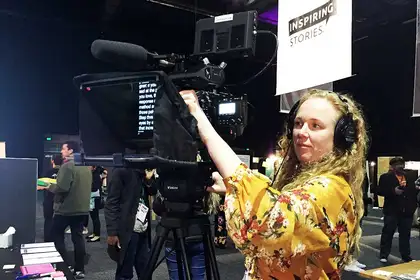
Associate Professor Elspeth Tilley behind the camera at Festival for the Future, where festival participants took the opportunity to try news-reading on-screen as part of a Massey exhibit showcasing the Bachelor of Communication.
by Associate Professor Elspeth Tilley
I came away from the recent Festival for the Future (FFTF) in Wellington with a great sense of hope for our future. The young people I met over the three days were without exception highly informed, extremely motivated and equipped with a wide range of skills, strengths and resources to offer solutions to big issues such as climate change, inclusion and mental health.
They were uniformly courageous and determined to give their all to their communities and to those most in need of help. Typically, these future leaders (actually most of them are current leaders, not waiting to grow old to show leadership but already active on youth councils and at the forefront of important social movements), already had 90 per cent of the ideas and resources they needed to make a genuine impact on a crucial issue. The role of FFTF was to offer that final 10 per cent step needed to make their next action happen. This could be to connect with like-minded others so they could see they were part of a much bigger change movement, to reaffirm their voice and confidence, or solve a final piece of the strategic puzzle of how to communicate about an issue in order to move forward. It was a privilege to be there and learn with and from these astute, enthused young people.
Some of the important things they taught me or reminded me to value included:
- We still don’t include enough history as told from Indigenous and Pacific perspectives in our education systems. Alarmingly, young people say they are not being taught systematically about colonisation and resistance in the Pacific and Aotearoa. They want to explore the issues that have led up to today’s intractable conflicts – which they see as ignorance about Indigenous knowledges, spirituality and land ownership – such as the events occurring at Ihumātao and Mauna Kea right now. They want to see Te Tiriti knowledge woven into every part of a bicultural education, and they say this is not happening adequately yet.
- Many school-age people feel their schools don’t have genuine structures to facilitate their input. In some cases this had led to conflict between students and school administrators, which young people felt could have been avoided if there were more opportunities for students to be heard and their expert understanding of their own age group was validated. Some schools, principals and teachers were clearly an exception to this but as a generalisation, young people were sharing tales of schools funnelling students’ energies into non-essential activities such as organising social events, and shutting them out of key decision-making around such issues as sustainability, disciplinary decisions and authentic inclusiveness. There are models internationally for fully-functioning democratic schools, and young people would like to see more courage with these kinds of models being applied here.
- Despite burgeoning empirical evidence that creativity is necessary to activate emotion and interest in the issues of our times, most social movements still don’t appear to think about creativity or the arts as part of their communication and action mix. Young people intend to take the lead now with asking, early in the planning, ‘How can we add artistic or creative responses to this?’
- The importance of manaakitanga: even simple things such as a ‘leave a letter, take a letter’ wall provided an effective way for FFTF19 delegates to share aroha, encouragement and caring with each other. Here’s the one I received: “I give you my faith and belief that you will achieve all the greatness that is destined [for] you. May the challenges you face teach you wisdom. May you always find the kindness in yourself and others. Arohanui.” What a beautiful affirmation from one human being to another – and one that sums up the collective positive spirit of kotahitanga (acting together in solidarity for the greater good) that was FFTF19.
Elspeth Tilley is an associate professor in expressive arts at Massey University, which was a sponsor for Festival for the Future. She spoke on using the arts to accelerate climate solutions, and hosted a roundtable with young people exploring their thoughts on creative activism. Festival for the Future is an annual conference run by Inspiring Stories Trust.